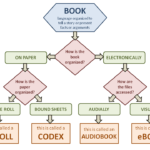
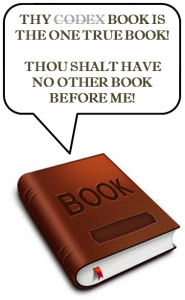 Remember a couple of weeks ago when codex fetishists were exuberant about a study they thought showed that reading e-books keeps you up at night?
Remember a couple of weeks ago when codex fetishists were exuberant about a study they thought showed that reading e-books keeps you up at night?
Except that the study really showed no such thing?
Well, they’re at it again. Continue reading

 Remember a couple of weeks ago when codex fetishists were exuberant about a study they thought showed that reading e-books keeps you up at night?
Remember a couple of weeks ago when codex fetishists were exuberant about a study they thought showed that reading e-books keeps you up at night?
Except that the study really showed no such thing?
Well, they’re at it again. Continue reading
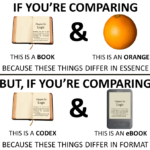
A book is the content, not the format. A stack of bound leaves is in codex format, a rolled sheet is a scroll, a recording reading is an audiobook, and a digital file is an ebook. But, all of these are books, and when codex fetishists claim their format is a “real book” all they’re really saying is that they care more about the object (“the smell, the feel!”) than the literature in it.
One recent trend in codex fetishism makes this prioritization of thing-over-literature extreme and explicit. Not satisfied with idolizing the codex as an aesthetically pleasing object, many artists use paper books as the raw material for art, destroying their textual value in service to the codex as a precious substance, stripped of its literary soul.
The emphases below are mine:
Artist Guy Laramee repurposes old books to build sculptures of nature scenes.
“I carve landscapes out of books,” he says in his artist’s statement. “Mountains of disused knowledge return to what they really are: mountains. Piles of obsolete encyclopedias return to that which does not need to say anything, that which simply is.” …
Laramee is one of many artists who use old books to create artworks.
Books that aren’t really knowledge and don’t need to say anything. Yup.
Check out the rest here at GalleyCat.

 Father: “I don’t have politics. I have a job.”
Father: “I don’t have politics. I have a job.”
Son: “What’s that supposed to mean?”
Father: “When I got a real job, a grown-up job, I left the polit—”
Son: “Got it. Leave the politics at home.”
Father: “No, you don’t ‘got it.’ I’m saying leave the politics in childhood, where it belongs.”
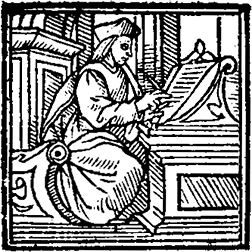 crimp (n.) (1) An unscrupulous recruiter for ships’ companies. In 1758 John Blake wrote,
crimp (n.) (1) An unscrupulous recruiter for ships’ companies. In 1758 John Blake wrote,
“a crimp … who makes it his business to seduce the men belonging to another ship.”
(2) An agent for a shipping company. In Franklin’s Autobiography, first published in 1791, he reported that:
“a crimp’s bill was put into his hand.”
–Colonial American English. by Richard M. Lederer, Jr.
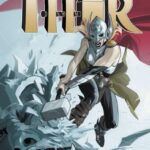
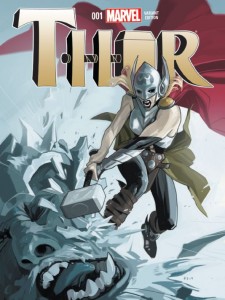 Remember when I defended Marvel’s new, female Thor on religious grounds? Well, according to Evan Bevins, apparently the new comic books series is pretty good in its own right:
Remember when I defended Marvel’s new, female Thor on religious grounds? Well, according to Evan Bevins, apparently the new comic books series is pretty good in its own right:
Three issues in and I’m sold on the all-new, all-distaff Thor.
The gender-bending take on one of Marvel’s mainstays shifted into high gear after an anti-climatic debut issue, with writer Jason Aaron delivering a book that reads first and foremost as fun and interesting, not a P.C. stunt like some feared …
[E]ven without prior familiarity with the storyline, the new “Thor” is a fun and accessible read. The villains are characters spotlighted in the two Thor feature films – the Frost Giants from the first and Malekith, the dark elf king, from the second. Malekith in this … has far more personality than the generically malevolent figure from “Thor: The Dark World.” He’s almost like a magical Joker, but with some restraint …
The art by Russell Dauterman (“Cyclops,” “Supurbia”) is bright and energetic, although once in a while there’s a panel that’s a bit too frenetic to follow clearly.So far, the story, dialogue and mystery elevate “Thor” from a curiosity to a promising read.
Check out the rest at Graffiti.
 NUTS of the anchor, two little prominencies, appearing like short square bars of iron, fixed across the upper part of the anchor-shank, to secure the stock thereof in its place; for which purpose there is a corresponding notch, or channel, cut in the opposite parts of the stock, of the same dimensions with the nuts.
NUTS of the anchor, two little prominencies, appearing like short square bars of iron, fixed across the upper part of the anchor-shank, to secure the stock thereof in its place; for which purpose there is a corresponding notch, or channel, cut in the opposite parts of the stock, of the same dimensions with the nuts.
-William Falconer’s Dictionary of the Marine.

 Reviewing the screenplay for The Wall, a story about a sniper pinned behind a wall by an enemy sniper who clearly knows him, Christopher Pendergraft at Script Shadow makes a fantastic observation on dialogue that every writer needs to read.
Reviewing the screenplay for The Wall, a story about a sniper pinned behind a wall by an enemy sniper who clearly knows him, Christopher Pendergraft at Script Shadow makes a fantastic observation on dialogue that every writer needs to read.
 You may have heard about the recent study “proving” that reading e-books will destroy your sleep cycle.
You may have heard about the recent study “proving” that reading e-books will destroy your sleep cycle.
Well, you didn’t really, because that’s not at all what the study shows, if it in fact shows anything. What you did hear was yet another round of mindless whooping among the prejudiced, paper-loving Luddites who don’t care how much pseudoscience and misinformation they have to spread in their crusade against e-books.
To show you what I mean, below the jump are three stories about the study, including details that show that it’s not completely the fault of science journalists. The researchers themselves are corrupting science with false dilemmas, false attribution of cause, and laughably poor methodology.